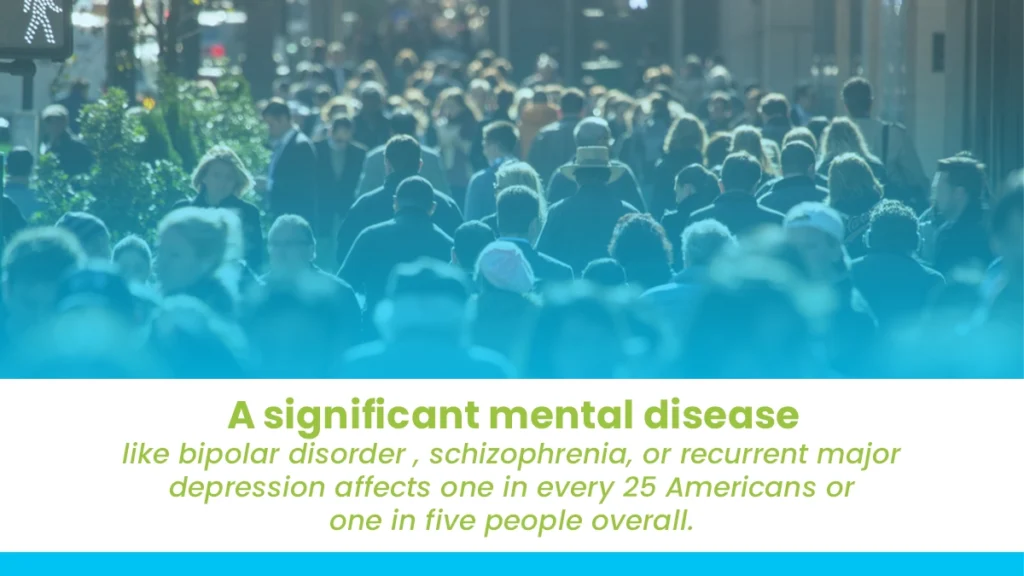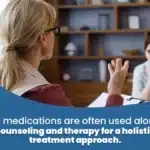
Many times in an individual’s life, they become anxious and stressed. The continued stressful situations may become problematic for you and your mental health.
A person goes through many stressful circumstances in life, such as family problems, unemployment, financial issues, and sadness can lead to various mental illnesses.
Some other factors contribute to the development of various mental health issues, such as genetics, environmental factors, etc.
The National Survey on Drug Use and Health of 2020 found that 21 percent of US individuals had mental health difficulties that year. This figure represents one in every five adults.
But the good news is that support and help are available for mental health problems. Many government-run bodies offer mental health services. The cause of which might be due to substance abuse.
Key Takeaways
Mental health is essential, and getting the right treatment for it is significant too. This article will highlight the following points:
- It is important to seek professional help at the right time for mental illnesses.
- Various government helplines available can guide you to overcome mental illnesses in different circumstances.
- There are agencies available on a national level for your support.
Contact our team at The Haven Detox-South Florida if you need help overcoming a mental health problem. You can call us at (561) 328-8627
Warning Signs of Mental Health Illness
The mental health of an individual has an impact on every aspect of life. Mental health specialists or health care providers often gauge the severity of a mental health problem based on how it affects a person’s day-to-day activities and the circumstances that gave rise to it.
Mild mental health challenges are frequently less persistent and disruptive to a person’s daily life. In contrast, serious mental illnesses can be so severe that they harm a person’s relationships and performance at work or school.
Different warning symptoms of mental illness can lead to serious mental conditions:
- Extreme mood changes
- Behavioral changes
- Low energy or will to do daily tasks
- Feeling sad about life
- Lack of communication with others
- Isolation from family members and friends
- Hallucinations
- Suicidal thoughts
If you see any of these symptoms, you take immediate medical assistance or can call your doctor for help.
Contact the National Suicide Prevention Lifeline at (800) 273-8255. If you are experiencing suicidal thoughts or behavior and get professional help immediately.
Seeking Help for Mental Illnesses
If you have a mental health problem, you must get medical help immediately. This is because mental health care is important to live a healthy life.
If you are going through any mental health disturbance or emotional distress, and have mental health concerns, contact your nearest healthcare provider for help.
If you notice any change in your behavior, you should talk to any loved one or your healthcare provider for assistance.
Friends can support you in other ways, such as providing a safe environment for discussing your thoughts, holding you responsible for your treatment goals, and consoling you when you feel overwhelmed. However, they cannot replace professional mental health assistance.
Importance of Seeking Help for Mental Health
A significant mental disease like bipolar disorder, schizophrenia, or recurrent major depression affects one in every 25 Americans or one in five people overall.
As per National Alliance on Mental Illness, fewer than 60 percent of persons with a mental illness do not receive treatment, and nearly half of the children aged eight to 13 do not either. This ratio is high in young adults and teens.
The justification for not receiving therapy varies from person to person. These motivations may include fear of judgment and exclusion because of their mental illness or even individual misconceptions about treatment efficacy.
When you seek early mental health treatment, it will help you overcome a hard time soon.
It is important to have the right treatment for your mental health illness. This will help you in returning to normal life.
Seek Immediate Support in Crisis
You can contact 911 in case of an imminent medical emergency or visit the nearest medical emergency room if one is accessible.
988 Suicide and Crisis Lifeline
You can seek immediate help by calling or texting at 988 in case of emergencies only. You can use their web chat, Lifeline Chat if you speak English.
Anyone needing 24-hour, confidential support due to an emotional crisis or suicidal ideation from a certified crisis counselor can call or text the helpline 988.
Veterans Crisis Line
The Veterans Crisis Line’s online chat service is accessible if you need assistance. Through the free, private Veterans Crisis Line, veterans can contact a qualified responder anytime, day or night.
Even if veterans are not registered in Veterans Affairs healthcare, they are still eligible to use the program with those who assist them.
Disaster Distress Helpline
You can call or text (800) 985-5990 if you need emotional support for mental health conditions resulting from any disaster.
Suppose you or any of your loved ones need crisis counseling due to a natural or artificial disaster. A 24-hour, multilingual, free, and confidential helpline is open all days of the week.
You can contact the social media company’s safety teams if you have concerns about a friend’s social media posts. To get the person the assistance they require, they will make contact.
Searching for a Mental Health Practitioner
Mental health issues can be treated generally with a blend of medication-assisted treatment and therapies. Therapy might be provided in person, over the phone, or online (telemental health).
When seeking mental health care, it can be challenging to know where to begin. Fortunately, there are various ways to locate a provider that can suit your primary needs.
Primary Health Care Practitioner:
When referring patients to mental health specialists, and early mental health screenings, your primary health care physician can be a valuable resource. When you have a scheduled discussion with your primary care physician, consider discussing your mental issues and requesting assistance.
Federal Resources:
Federal agencies offer some effective resources. These resources are the national-level agencies that assist you in finding potential healthcare providers.
Moreover, you will also be able to locate cheap health services. These resources include:
(SAMHSA) Substance Abuse and Mental Health Services Administration, If you want to locate mental health services in your local community, organizations like SAMHSA can help you.
For any general information, you can make a call at (800)-662-HELP (4357), which is SAMHSA’s National Helpline.
On its website, SAMHSA also offers a treatment locator for behavioral health services that allow users to search by area.
Health Resources and Services Administration (HRSA):
The HRSA organization functions to make improvements in the accessibility to healthcare. Finding accessible healthcare is made easier thanks to the HRSA website, which lists medical facilities that charge patients according to a sliding scale.
Centers for Medicare & Medicaid Services (CMS):
CMS offers information on enrolling in mental health programs and details on benefits and eligibility.
The National Library of Medicine (NLM) MedlinePlus:
The National Library of Medicine’s (NLM) MedlinePlus website lists businesses and directories that can be used to find a healthcare professional.
Professional Organizations and Advocacy
When searching for a mental health practitioner, advocacy and professional groups can be valuable resources for information. Their websites frequently include resources for identifying mental health professionals; some even offer practitioner locators.
Few examples include the following:
- National Alliance on Mental Illness
- Depression and Bipolar Support Alliance
- Anxiety and Depression Association of America
- Mental Health America
Country and State Agencies
Health services in your nearby location may be listed on the state or county government websites. You can find this information by searching their websites and conducting a search for the department of health services.
Insurance Firms
If you have insurance coverage, a spokesperson from your insurance provider can tell you which plan covers local doctors and other healthcare providers. Various health insurance providers’ websites have searchable databases that you can use to find a participating doctor in your area.
College, University, or Medical Institutions
The college or university you are studying in might offer treatment for mental health illness. Try looking for these on the websites of nearby university health facilities’ departments of psychology, psychiatry, counseling, or volunteer work.
Assistance for Military Personnel and Families
Those veterans who are now serving in the military or have served in the past may have distinct mental health difficulties.
For resources for both military members and veterans, please visit:
- MentalHealth.gov
- United States Department of Veterans Affairs
Drug addiction or alcohol abuse can cause addiction and mental health disorders. It is recommended to seek help from your primary care doctor.
Most of the time, healthcare professionals also recommend counseling from a psychologist if you are going through a mental health crisis.
They help you in getting good mental health back. Get help from the right medical centers for your mental disorders.
Frequently Asked Questions (FAQ)
What is the best way to get mental health help?
If you are facing mental health issues, immediate help is required. You can call any state organization to seek guidance or take a recommendation from your doctor. Medical professionals can suggest the best way after examining your situation.
You can share your problem with your friend or family member. Emotional support from your close ones matters a lot. This helps you get better mental health and regain the balance of life.
Mental health is an important thing to maintain a normal balance of life. You may suffer from various illnesses if your mental health is not good.
What are the three types of help available for mental disorders?
The treatment options available for mental health disorders include the following:
Medications: Medications are effective in treating mental health issues. These medications lessen an individual’s symptoms and help him recover.
Support groups: Support groups are also effective for treating mental health disorders. When you share your problem with others, they might suggest a solution that works for you.
Self-Help Plan: You can follow any self-care plan which supports you in recovery from any mental health problem.
Contact The Haven Detox-South Florida To Help You with Mental Health Issues
There are a lot of individuals in the United States who face different mental health problems. The first step to overcoming them is recognizing them and getting the right treatment.
Treatment facilities offer you professional medical help to overcome mental health problems.
The Haven Detox-South Florida is a rehab center working in the United States. They have helpful team members who assist you on your road to recovery.
We provide a complete detox program to help people overcome drug misuse and alcoholism.
Together with SMART Recovery therapy, our inpatient treatment aids in your return to recovery.
Contact us at (561) 328-8627 for more information.






